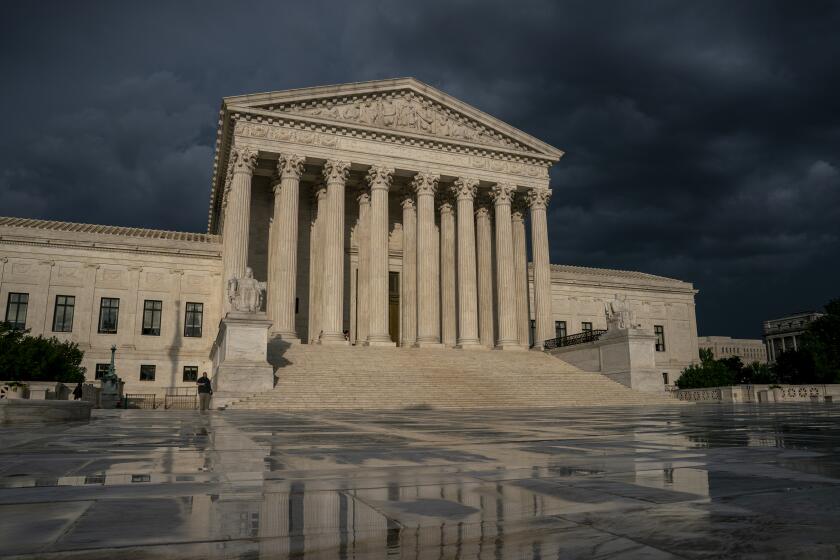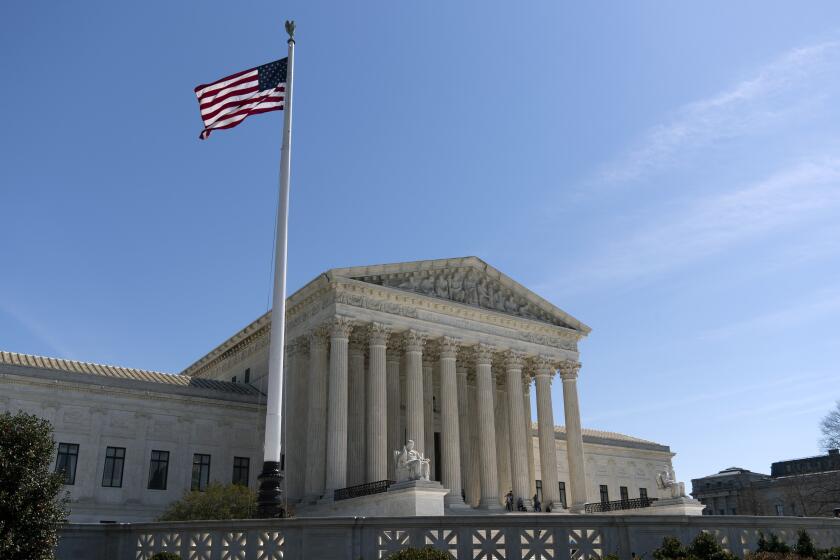Op-Ed: As a new Supreme Court term begins, prepare for the law to move even more to the right

- Share via
As the Supreme Court begins its new term on Monday, it’s clear that the court’s majority is determined to move the law much further to the right. The last term ended with the court overruling Roe vs. Wade, dramatically expanding gun rights, rejecting the separation of church and state and limiting the power of administrative agencies.
About half the docket for the new term is set, and what is striking is how the court is reaching out to take and decide cases to further its conservative vision of the Constitution. Traditionally the justices have focused on granting review in cases where there is a disagreement among the lower courts — with the Supreme Court’s role being to resolve these conflicts. Often in the past, the justices have stressed that they want to wait until many lower courts have ruled — until the issue has “percolated,” before weighing in.
But in many of the high-profile cases for this coming term, the court has stepped in even though there is no disagreement among the lower courts.
Once considered a fringe philosophy, originalism is now embraced by the conservative court to justify its worst decisions.
For example, on Oct. 31, the Supreme Court will hear two cases about whether to end affirmative action by colleges and universities, Students for Fair Admissions vs. University of North Carolina and Students for Fair Admissions vs. Harvard College. In decisions in 1978, 2003 and 2016, the court held that colleges and universities have a compelling interest in having a diverse student body and may use race as one factor in admissions decisions in carrying out their educational mission.
This is settled law. Affirmative action, like abortion, has long been a target of conservatives. The widespread expectation is that here, too, the activist conservatives on the court will overrule more than 40 years of precedents they oppose politically.
Nothing about the law in this area or how it has been interpreted by the lower courts calls for reopening this issue. All that has changed since 2016 is that three Trump-appointed justices — Neil M. Gorsuch, Brett M. Kavanaugh and Amy Coney Barrett — have joined the court.
Two voting cases of potentially great significance also are before the court. Merrill vs. Milligan, which will be argued on Tuesday, involves the application of the Voting Rights Act of 1965 to racial discrimination in the drawing of congressional districts. A three-judge court in Alabama — with two judges who were appointed by President Trump and one by President Clinton — found that the districts drawn in Alabama were racially discriminatory. Black individuals make up 27% of the population in Alabama, but only one out of seven congressional districts in Alabama had a likelihood of electing a Black representative.
The three-judge court ordered new districts be drawn, but the Supreme Court, by a 5-4 vote, stopped this in an emergency order and chose to hear the case.
The court, in its prior rulings over the last decade, has already greatly weakened the Voting Rights Act. There is good reason to fear that the conservative justices will make it harder to prove that election districts are drawn in a racially discriminatory manner — or perhaps even rule that considering the race of the people in the district in detecting discrimination is unconstitutional.
Some observers worry that the court might go so far as to rule that any law that prohibits racially discriminatory effects is unconstitutional. Such a ruling would eviscerate many civil rights laws that create liability on proof of disparate impact in employment, housing and voting.
Even in the face of clear threats to public health and the planet, the conservative justices severely limited the EPA’s authority.
The other election case, expected to be argued in November, is Moore vs. Harper. The North Carolina Supreme Court found that the state Legislature violated the North Carolina Constitution by engaging in partisan gerrymandering to ensure that Republicans win 10 of 14 congressional seats even though the state is almost evenly split between the two parties.
That court decision was rooted in law and good sense. Yet the Roberts court took review of the case even though there was no special or unusual action by the North Carolina court. The GOP challengers argue that under the U.S. Constitution only the state legislature can decide matters concerning congressional elections. This stance has never been validated and would eliminate any form of state judicial review in such cases.
If the court embraces this bizarre argument, known as the “independent state legislature” theory (Justices Clarence Thomas, Samuel A. Alito Jr. and Gorsuch have already indicated their support), then state courts would be powerless to stop even the most egregious violations of the law.
Even more frightening, if the justices accept this theory regarding congressional elections, they could well apply the same reasoning to another constitutional provision — Article II, Section 1 — which addresses state legislatures’ role in the selection of presidential electors. That provision is not relevant to the gerrymandering dispute and is not before the Supreme Court. But if the court adopts the “independent state legislature” theory, a state legislature would have the power to award the state’s presidential electors to the candidate that lost the popular vote — even in violation of state law — and change the outcome of the presidential election.
303 Creative LLC vs. Elenis is another discrimination case that will be heard by the Supreme Court even though there is no controversy among the appeals courts. The issue in this case is whether a business owner may violate state anti-discrimination law on account of her religious beliefs. Lorie Smith has a business in Colorado designing websites and wants to do that for weddings, but she says she won’t do it for same-sex weddings, even though such discrimination violates Colorado law. The question is whether she can use free speech as a defense against the state law. If the justices rule in her favor, they could open the door to discrimination by business based on sexual orientation, sex and even race simply by claiming their discrimination is protected by the 1st Amendment.
This will be the first term for Justice Ketanji Brown Jackson, the first African American woman on the court, a milestone in American history. Her voice will be greatly valued, but there remain six staunchly conservative justices who are willing to change the course of constitutional law as it has developed over the past five decades. Voting rights, racial equity and the power of states to ban discrimination are all on the line, and this is with less than half the docket set for the new term.
Erwin Chemerinsky is a contributing writer to Opinion and dean of the UC Berkeley School of Law. His latest book is “Worse than Nothing: The Dangerous Fallacy of Originalism.”
More to Read
A cure for the common opinion
Get thought-provoking perspectives with our weekly newsletter.
You may occasionally receive promotional content from the Los Angeles Times.












